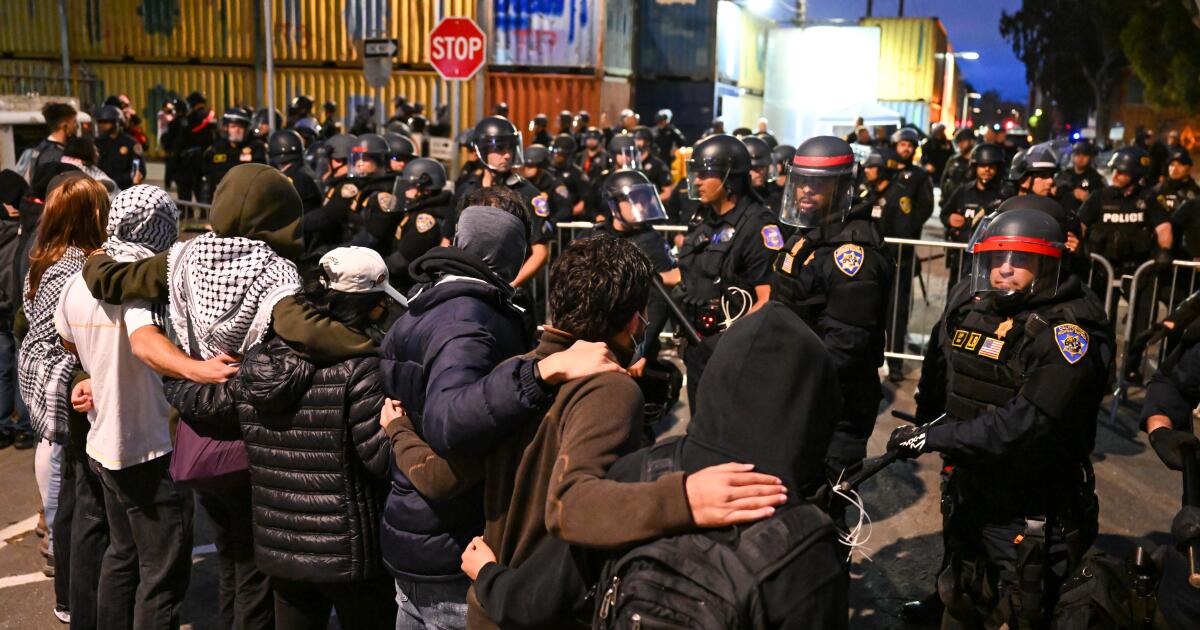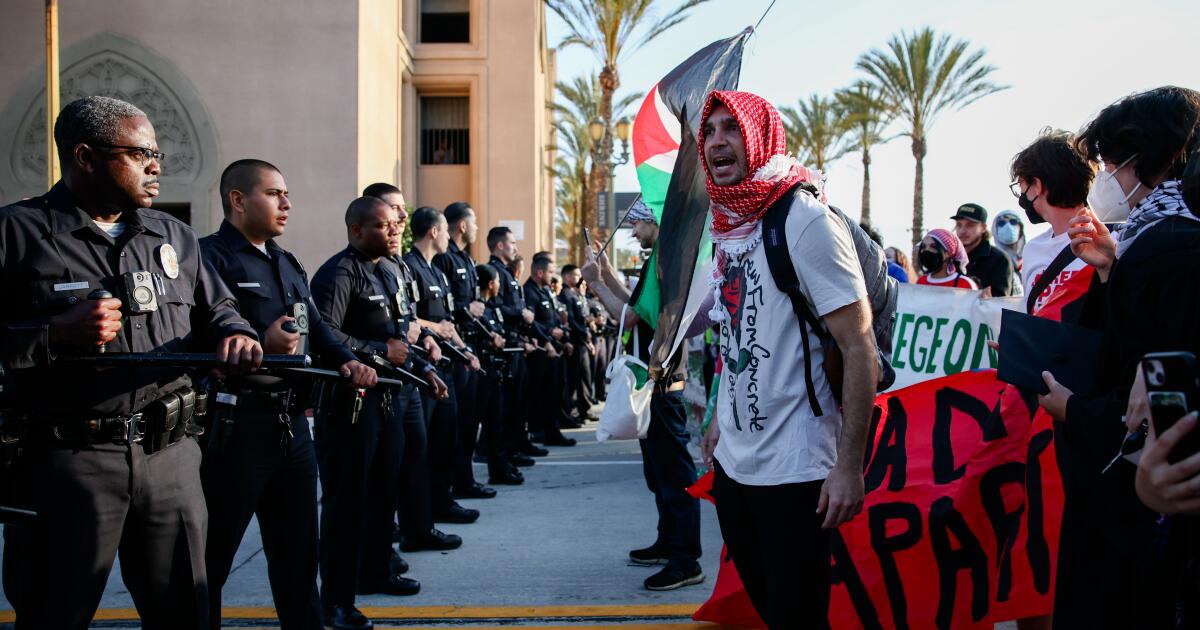World News
L.A. City Council votes to allow demolition of Jewish and labor movement landmark


The Los Angeles City Council voted unanimously Friday to allow the demolition of a century-old building in the Westlake neighborhood that served as a Jewish landmark and later as the heart of labor organizing in the city.
The vote was a victory for Catholic Charities, which bought the building historically known as the B’nai B’rith Lodge in 2018 but later said it was “seriously dilapidated and structurally unsound” and could threaten the safety of the surrounding neighborhood.
Catholic Charities, a nonprofit organization connected to the Archdiocese of Los Angeles, filed a lawsuit against the city in 2023, saying it had wrongly been denied permission to tear down the ornate 1924 structure.
The group said in court documents that the city would not allow demolition of the property on South Union Avenue because it “may be historic,” making it subject to further additional review, as well as because any future projects on the lot must comply with the California Environmental Quality Act.
Community preservationists and advocates argued that a potential demolition would be a blow to crucial L.A. history. Instead, they urged Catholic Charities to repair the building and put it to use.
The Rev. Dylan Littlefield, the chaplain at the Cecil Hotel who has become involved in preservation battles, said the lodge’s demolition would mean the destruction of a place that stood as a “testament to the resiliency and the diversity of the city of Los Angeles.”
Esotouric, a tour company that advocates for historic preservation and public policy, told The Times before the settlement vote was announced that the public should have a chance to comment. The company called the lawsuit — and any prospective settlement — a potential “land-use decision about the right to demolish a cultural resource.”
The city attorney’s office declined to comment, citing the pending litigation.
The B’Nai B’rith lodge was designed by the famed Jewish architect Samuel Tilden Norton, who also designed the Wilshire Boulevard Temple.
It was built in the early 1920s as the home for an L.A. chapter of the B’nai B’rith, a Jewish service organization with New York roots. At the time, members of the B’nai B’rith felt a “desire to really be accepted by the leaders of the city,” according to Steven Luftman, a heritage conservation consultant.
“They felt that if they only built a grand enough meeting hall, that that would be one step toward being recognized as part of the community,” said Luftman, who wrote an application for the lodge to be deemed a historic-cultural monument.
After a few years of being a community hub for Jewish L.A., the building was sold in 1930 to the Fraternal Order of Eagles. It then had a brief tenure as clubhouse for the Safeway Employees’ Assn. before it became the headquarters of the American Federation of Labor Teamsters Joint Council 42.
It became the site for rapid growth of the labor movement, and is where the Teamsters elected their first Black official, John T. Williams, according to Luftman.
“The AFL Teamster building was the heart of the Los Angeles labor movement and ground zero for much of the union organizing that transformed Los Angeles into a metropolitan powerhouse,” said Chris Griswold, Teamsters Joint Council 42 president.
B’nai B’rith International said in a statement that the lodge “represents an important part of the history of our organization in Los Angeles.”
“However this is resolved, it would be important to the history of Los Angeles Jewry to note that B’nai B’rith met there,” the statement said.
Catholic Charities and the archdiocese respect the building’s history and “have been in communication with both the Jewish community and labor leaders throughout this process,” the religious groups said in a joint statement. “Our concern has always been the safety of the dilapidated property and well-being of our neighborhood.”
In the lawsuit, Catholic Charities said it has no projects planned for the lot, and stressed that its intention is to simply demolish the lodge.
“Catholic Charities incurs ongoing costs of hundreds of thousands of dollars a year to maintain and secure the building, which is vacant, deteriorated and unstable,” the court document read. “These funds are being diverted from critical programs to help disadvantaged communities.”
The groups said their hope was to “work with the community and the council office to eventually find a use for the property consistent with Catholic Charities’ mission, such as community food service, an emergency shelter, transitional youth housing, before and after school care, and older adult services.”
Littlefield, the chaplain at the Cecil Hotel, said Catholic Charities’ rationale was “just an excuse to justify their desire to tear the building down.”
“The building itself could be a place of empowerment,” Littlefield said. “The building itself could be a place where more movements like this takeoff, where more great things happen, where more lives are saved and changed.”
World News
Why All Married People Need a Post-Nuptial Agreement

Marriage is usually talked about in terms of love and relationships—the intensity of emotion you feel toward one another, and the safety and security of finding your Person and knowing you’ll spend the rest of your life with them.
Except, of course, that the time spent married is typically less than a decade—most marriages in the U.S. end after about seven years. Most marriages end in divorce—about half of all first marriages wind up in divorce court, and that rate skyrockets with second (67%) and third (73%) marriages.
That’s why it’s important to remember that marriage is a legally binding contract as much as it is a symbolic joining of two souls. Viewed like that, stuff like pre-nuptial agreements don’t seem so cold and brutal; they can be a godsend if your marriage is one of those that don’t make it. If you’ve already gotten married, it’s not too late to get rational about your partnership and enshrine your mutual understanding in writing, though. You can always draw up a post-nuptial agreement.
Post-nuptial agreements
A post-nuptial agreement is exactly what it sounds like: a legal agreement between spouses that you create and sign after you’re already married. You might enter into one because you didn’t create a pre-nuptial agreement and want to clarify things, or your financial situation has changed and now you feel the need to formalize some understandings. The crucial difference is the focus of the document: A pre-nup is mostly focused on you as an individual, with no implied obligation to your spouse—it protects the assets you already had before the marriage. A post-nup explicitly deals with your obligation to your spouse.
Post-nuptial agreements typically outline a few common aspects of your legal and financial responsibilities to each other:
-
Inventory and division of assets. A post-nup will typically clearly state who owns what, and how the assets will be divided in the case of divorce. This can range from property like a home to investments to a family-owned business. For example, if the couple has a shared investment portfolio but one spouse contributes 75% of the money invested in it, the post-nup could specify that the funds will be split 75-25 in case of divorce, which can spare you a lot of squabbling.
-
Allocation of debts and other obligations. A post-nup can also clearly define who will be responsible for debts that are currently shared within the marriage. If you took out a large loan, for example, or have a car payment or mortgage, the post-nup defines who carries that debt if the marriage is dissolved.
-
Alimony and support. A post-nup can also define future financial arrangements, like spousal support. For example, if one spouse stops working in order to care for children and take care of the home, the post-nup could define the earnings they sacrificed and require the other spouse to pay support. This can make a partner feel more secure in their choice to give up a career.
A post-nuptial agreement can also contain provisions for future property and financial windfalls. For example, it can specify that any property acquired by either partner after signing the post-nup will be considered their individual asset and not a shared one. You can also define how inheritances will be handled, or how large gifts will be handled. For example, if one spouse’s parents gave the couple a large monetary gift in order to purchase a house, the post-nup can define whether the other spouse should repay their share of that gift or if it should be forgiven and considered moot.
One thing you can’t put in a post-nuptial agreement is custody arrangements. Even if both partners agree on plans for children in the case of divorce, the actual decisions surrounding custody and support are almost always reserved for the court to decide based on the best interests of the child. Even if you try to codify custody and support in your post-nup, it won’t be enforceable unless a court agrees with you on every point.
How to create a post-nuptial agreement
Post-nuptial agreements can be a murky area of the law, depending on where you live. Some states have clear legal guidelines for them; other states have very little precedent. Your best bet is always to engage the services of an experienced family lawyer when crafting one to ensure it will be enforceable in your state.
Generally speaking, however, as long as the agreement satisfies some basic principles you’ll be fine. The agreemnet should be:
-
In writing. The agreement has to be in writing—an “understanding” or oral contract, even if affirmed by both parties, is usually not going to cut it. And both parties must sign the agreement in a legally acceptable way.
-
Voluntary and just. Neither partner can be pressured or compelled into signing the post-nuptial agreement. For example, if one partner threatens to leave the other penniless unless they sign an agreement that strongly favors them, that agreement is most likely unenforceable.
Similarly, the terms of the agreement must usually also be reasonable and fair. Even if both sides agree, if the courts find any provisions to be unconscionable or unjust the agreement may be rejected.
-
Comprehensive. Post-nuptial agreements have to fully disclose all relevant information. Hiding assets or other information can render the whole agreement unenforceable.
Like pre-nuptial agreements, post-nups don’t only apply to troubled marriages. These agreements can create a sense of security for both partners by providing clear guidelines, an inventory of assets, and other ground rules for the marriage. Plus, since these agreements remove much of the financial uncertainty surrounding divorce, they can also help couples focus more on the emotional bonds between them and the relationship, because they don’t have to worry about maneuvering financially to protect themselves.
World News
Julian Assange trial in London could decide whether the WikiLeaks founder is extradited to the US

- WikiLeaks founder Julian Assange faces a court hearing in London that could end with him being sent to the U.S. to face espionage charges, or provide him with another chance to appeal his extradition.
- The U.S. has assured judges that Assange’s rights would be protected and that he would not face the death penalty in the event of extradition, but Assange’s legal team argues they are not good enough to rely on.
- Assange was indicted on 17 espionage charges and one charge of computer misuse over his website’s publication of classified U.S. documents almost 15 years ago.
Julian Assange faced a key hearing Monday in the High Court in London that could end with him being sent to the U.S. to face espionage charges, or could provide him another chance to appeal his extradition.
The WikiLeaks founder, who has spent the past five years in a British prison, was not in court to hear his fate being debated. He did not attend for health reasons, his lawyer Edward Fitzgerald said.
The outcome of the hearing will depend on how much weight judges give to assurances U.S. officials have provided that Assange’s rights won’t be trampled if he goes on trial.
In March, two judges rejected the bulk of Assange’s arguments but said he could take his case to the Court of Appeal unless the U.S. guaranteed he would not face the death penalty if extradited and would have the same free speech protections as a U.S. citizen.
The court said that if Assange, who is an Australian citizen, couldn’t rely on the First Amendment then it was arguable his extradition would be incompatible with the European Convention on Human Rights, which also provides free speech and media protections.
The U.S. has provided those reassurances, though Assange’s legal team and supporters argue they are not good enough to rely on to send him to the U.S. federal court system.

Protesters hold placards outside the High Court in London on May 20, 2024. WikiLeaks founder Julian Assange faces a hearing Monday in the High Court in London that could end with him being sent to the U.S. to face espionage charges, or provide him with another chance to appeal his extradition. (AP Photo/Kin Cheung)
The U.S. said Assange could seek to rely on the rights and protections of the First Amendment but that a decision on that would ultimately be up to a judge. In the past, the U.S. said it would argue at trial that Assange is not entitled to the constitutional protection because he is not a U.S. citizen.
“The U.S. has limited itself to blatant weasel words claiming that Julian can ‘seek to raise’ the First Amendment if extradited,” his wife, Stella Assange, said. “The diplomatic note does nothing to relieve our family’s extreme distress about his future — his grim expectation of spending the rest of his life in isolation in U.S. prison for publishing award-winning journalism.”
Assange, 52, has been indicted on 17 espionage charges and one charge of computer misuse over his website’s publication of a trove of classified U.S. documents almost 15 years ago. American prosecutors allege that Assange encouraged and helped U.S. Army intelligence analyst Chelsea Manning to steal diplomatic cables and military files that WikiLeaks published.
Commuters emerging from a Tube stop near the courthouse couldn’t miss a large sign bearing Assange’s photo and the words, “Publishing is not a crime. War crimes are.” Scores of supporters gathered outside the neo-Gothic Royal Courts of Justice chanting “Free Julian Assange” and “Press freedom, Assange freedom.”
Some held a large white banner aimed at President Joe Biden, exhorting: “Let him go Joe.”
Assange’s lawyers say he could face up to 175 years in prison if convicted, though American authorities have said any sentence would likely be much shorter.
Assange’s family and supporters say his physical and mental health have suffered during more than a decade of legal battles, which includes seven years spent inside the Ecuadorian Embassy in London from 2012 until 2019. He has spent the past five years in a British high-security prison.
Assange’s lawyers argued in February that he was a journalist who exposed U.S. military wrongdoing in Iraq and Afghanistan. Sending him to the U.S., they said, would expose him to a politically motivated prosecution and risk a “flagrant denial of justice.”
The U.S. government says Assange’s actions went way beyond those of a journalist gathering information, amounting to an attempt to solicit, steal and indiscriminately publish classified government documents.
If Assange prevails Monday, it would set the stage for an appeal process likely to extend what has already been a long legal saga.
If the court accepts the word of the U.S., it would mark the end of Assange’s legal challenges in the U.K., though it’s unclear what would immediately follow.
His legal team is prepared to ask the European Court of Human Rights to intervene. But his supporters fear Assange could be transferred before the court in Strasbourg, France, could halt his removal.
Judges Victoria Sharp and Jeremy Johnson may also postpone issuing a decision.
CLICK HERE TO GET THE FOX NEWS APP
If Assange loses in court, he still may have another shot at freedom.
Biden said last month that he was considering a request from Australia to drop the case and let Assange return to his home country.
Officials provided no other details but Stella Assange said it was “a good sign” and Australian Prime Minister Anthony Albanese said the comment was encouraging.
World News
Iran’s President Dies in Crash, and Trump Trial Enters Final Days

Plus, Baltimore bridge ship to be moved.
Source link
-

 African History4 months ago
African History4 months agoBlack History Facts I had to Learn on My Own pt.6 📜
-

 African History4 years ago
African History4 years agoA Closer Look: Afro-Mexicans 🇲🇽
-

 African History1 year ago
African History1 year agoPROOF AFRICAN AMERICANS AIN'T FROM AFRICA DOCUMENTED EVIDENCE
-

 African History2 years ago
African History2 years agoHow Did Normal Medieval People Survive Winter? | Tudor Monastery Farm | Chronicle
-

 African History4 years ago
African History4 years agoA Closer Look: Afro-Mexicans 🇲🇽
-

 African History3 years ago
African History3 years agoWhat happened to the many African Kingdoms? History of Africa 1500-1800 Documentary 1/6
-

 African History3 years ago
African History3 years agoThe Entire History of Africa in Under 10 Minutes – Documentary
-

 African History2 years ago
African History2 years agoAFRO MEXICO: Black History In Mexico!






























